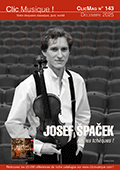 On imagine l’état de stupéfaction du public le 23 octobre 1957 lorsque Karel Ancerl à la tête la Philharmonie tchèque conclut "Mysterium casu" de son ami Kabelac. Pourquoi un tel monument est-il absent des concerts, mystère ! Le musicologue Harry Halbreich écrivait pourtant en 1965 : "Sombre, austère jusqu’à la nudité, son inspiration montre une ampleur de souffle et une maîtrise architecturale qui subjuguent". Marko Ivanovic nous offre aujourd’hui une version époustouflante de cette ensorcelante arche symphonique. D’une brume sonore émerge une mélodie en notes longues soutenue par les timbales. Une vague enfle, le rythme s’accentue dans un tournoiement implacable pour atteindre son apogée avec des trompettes hurlant le thème fondamental avant une vertigineuse descente vers l’apaisement. "Improvisations sur Hamlet" pour le 400e anniversaire de la naissance de Shakespeare est une riche méditation orchestrale sur l’éternelle question du héros. Les neuf courtes parties de "Reflets" déroulent un tempérament varié, solennel, exubérant et énigmatique. "Métamorphoses II" en six parties, dernier opus du compositeur, est un concertino pour piano basé sur l’antique choral tchèque "Mon Dieu, aie pitié de nous" menant au repos où tintent les cloches avant une conclusion imposante de tout l’orchestre. Un CD primordial. (Gérard Martin)  L’œuvre de Kabelac, emblématique des années de plomb où la Tchécoslovaquie était enferrée dans la gangue soviétique, risquait de sombrer dans un certain purgatoire depuis les gravures historiques que leur avaient consacrées Karel Ancerl, Vaclav Smetacek, Alois Klima ou Martin Turnovsky, même si Supraphon les a maintenues tant bien que mal à son catalogue. Bonheur de voir donc un chef de la jeune génération se dévouer à l’illustration d’un corpus historiquement essentiel : Après l’intégrale des Symphonies (voir ici), il réunit quatre œuvres emblématiques de l’évolution de l’univers Kabelac (que l’éditeur fait mourir un peu jeune, 1953 au lieu de 1979). La grande Chaconne de "Mystery of Time" avance, imparable, sombre superbe qui édifie son crescendo exalté où passent quelques souvenirs de Chostakovitch ; "Hamlet Improvisation", qui bat à l’incipit son tambour, invite à un théâtre d’orchestre fascinant et sans équivalent au début des années soixante de ce coté ci du Rideau de fer, alors que "Reflets" cherche dans un jeu mathématique l’équivalence sonore –formes et couleurs – d’une toile de Kupka : neuf haïkus de timbres. Quasi ultima verba "Metamophoses II", avec son piano minimaliste, montre qu’à son terme Kabelac regardait d’autres mondes, déconcertants au premier abord. (Discophilia - Artalinna.com) (Jean-Charles Hoffelé)  With his life and work, Miloslav Kabelác, one of the greatest 20th-century Czech symphonists, foregrounded a highly topical theme: the necessity of not yielding to evil and commitment to humanistic ideals. He displayed both during the Nazi occupation and the time of Communist dictatorship in Czechoslovakia. Within the toughest totalitarianism Kabelác escaped the ideological grip of the authoritarian regime by looking up to the star-studded sky. In The Mystery of Time, an underestimated gem of 20th-century European symphonic music, he expresses his emotional trepidation of and fascination with space, the solid order that governs the cosmos. Amidst the easing of the political oppression in Czechoslovakia in the 1960s, Kabelác garnered international esteem and created two major pieces: Hamlet Improvisation (marking the 400th anniversary of William Shakespeare’s birth) and Reflections. In the wake of the Soviet invasion in August 1968, the Communist government again tightened the screws, striving to silence the open-minded composer’s music at home and abroad alike. Kabelác completed Metamorphoses II just a few weeks before his death. His final work is inspired by the oldest Czech hymn Hospodine, pomiluj ny (Lord, Have Mercy On Us), symbolically ending with the prayer Kyrie eleison, repeated three times. The Mystery of Time album links up to the acclaimed recording of Kabelác’s symphonies (Supraphon, 2016), thus supplementing the artist’s remarkable discography with other jewels.
 |
